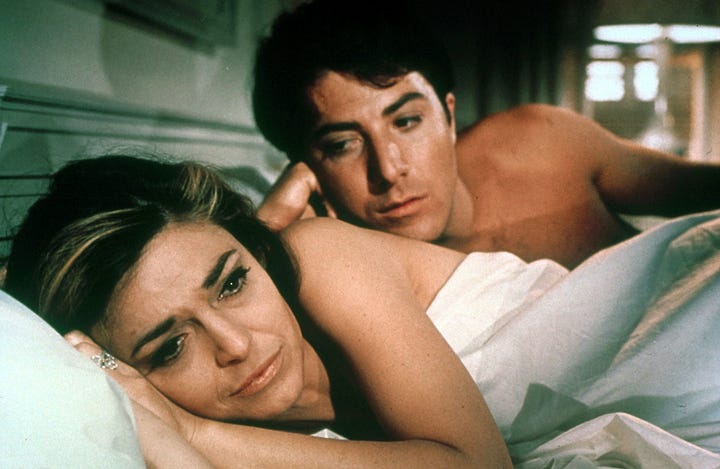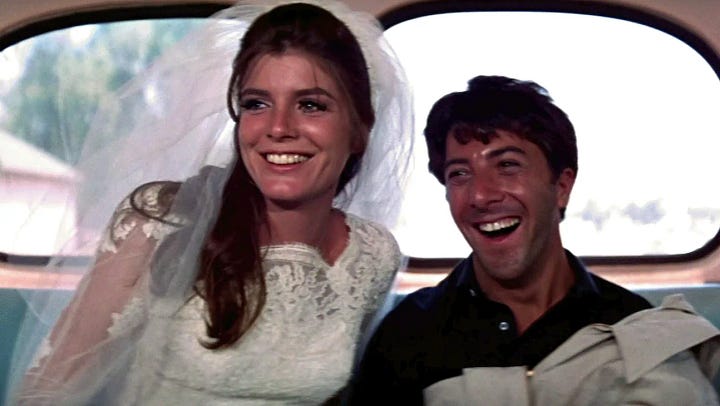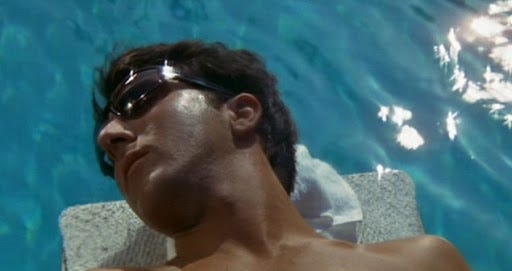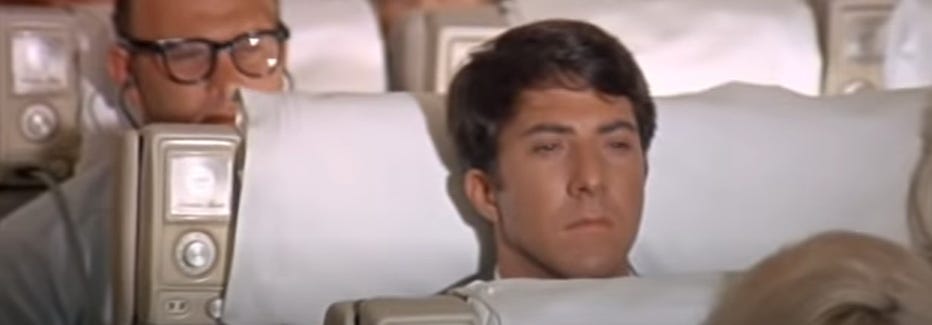The Graduate (1967) and how it depicts the clusterf*ck of post-grad
The Graduate (106 minutes)
Director: Mike Nichols
Cast: Dustin Hoffman (Benjamin Braddock), Anne Bancroft (Mrs.Robinson), Katherine Hoss (Elaine Robinson)
Screenplay: Charles Webb
Synopsis: Benjamin, a recent college graduate very worried about his future, finds himself in a love triangle with an older woman and her daughter.
Streaming on Tubi!
Mike Nichols’s The Graduate is genuinely one of the most absurd movies I have ever seen. When I first finished it, I wasn’t quite sure how I felt. The film was weird from start to finish, but honestly, I think that’s because it subverted my expectations so much. As I got closer to the end, though, I realized The Graduate was exactly the film I needed to watch while struggling with the difficulties of post-grad life. I hate post-grad—I really do—but The Graduate helped me see that even though it’s hard and uncertain, everything will be fine (right?).
Before watching, I knew The Graduate explored the existential dread of post-grad life through the eyes of recent graduate Benjamin Braddock, but the way the film executed this concept was a eerie surprise. I expected this film to be more demure and less exaggerated, but it was something over-the-top and odd. I thought it would be a low-key film that would show Benjamin on his day-to-day as he navigates what to do post grad, his complex relationships, and by the end he forms a strong sense of identity which propels him to figure out his life. However, this film took a left turn and showcased a wacky love triangle between Benjamin, his parent's friend Mrs. Robinson and Mrs. Robinson's daughter, Elaine. I was absolutely not prepared for how this film would unravel. Yet, given its unique plot, the way it was executed was a delight to watch.
There is so much to unpack in The Graduate. From a technical standpoint, this film excels in lighting, editing, blocking and cinematography to unravel the complexities of post grad.
I loved how this film used contrast lighting between dark and light, whether that be on Benjamin's face or turning a light on and off in a scene based on the conversation. The constant split lighting on Benjamin's face showed us how he was caught between two sides of his personality: the lit side, which was his old, successful, confident college self, and the shadowed side, which was his unstable, downcast post-grad self. This split lighting further dramatized the scenes were Benjamin was already uncomfortable and unsure. In other films that I have watched, I felt that lighting is not intentionally paired with the story, and it is executed in a way where it feels like lighting was a checkbox to fill rather than a storytelling element. However, The Graduate is one of the few films where you can immediately see how lighting goes beyond a checkbox; it is key element of the story with how its used in settings and characters.

In terms of editing, this film perfectly captures the wonky feeling of how time seems to pass in post-grad life. It has a few small sequences where the editing is choppy, but most scenes feel long and drawn out—just like post-grad. As a recent college grad living at home with no idea what I’m doing, every day feels endless. My days are too quiet, locked into a strict routine, monotonous, and there is very little to look forward to or moments where I feel at peace. The montage sequences in The Graduate capture this feeling best. They are intentionally crafted, from the scenes spliced together to the transitions, the repeated use of the same song, the zoom-ins, and the timing of each sequence, to evoke this prolonged, monotonous atmosphere. One montage sequence that executes this well shows Benjamin floating in the pool during the day and then meeting Mrs. Robinson at night. Not only were some of the transitions satisfyingly clean, but each sequence—especially the ones with Benjamin at home—was dragged out to convey this never-ending loss of time in post-grad life. For me watching this, it was a harsh reality check.


When it comes to cinematography, I want to particularly discuss zoom-ins and zoom-out shots. These shots are common shots, but I cannot think of a film that has made me more ecstatic and impressed by their execution than The Graduate has. The way this film does its zoom-ins/outs is literally perfect- no notes. Although the zoom-in and zoom outs are rather lengthy they effectively enhance the prolonged feeling that post-grad life brings, as discussed above. Furthermore the zoom-ins and outs juxtapose the inner turmoil Benjamin is battling against his more calm and minute surrounding environment. The film displays this right from the start, where we see a closeup of Benjamin’s uneasy face on the flight, followed by a long zoom-out that reveals the rest of the plane. where the passengers are relaxed and ready to land. This juxtaposition symbolizes two things: the isolating nature of post-grad and the idea that it’s not the end of the world because, ultimately, we’re all just fish in a sea trying to get by, and eventually, everything will be fine. In a way, it highlights the present and the future. The long zoom-out shot symbolizes that passage of time; we are uneasy in the present, but with time, everything works out in the end.
Lastly, let's unpack the plot of The Graduate, which as I said before is something. However, I believe the absurd progression of the story is exactly what is necessary to showcase the bitter truth of post-grad. Post-grad challenges your expectations, it’s discombobulating, bittersweet, a time of painful growth, identity struggles, changing personal relationships and overall, post-grad is a pain in the ass. Post-grad is a time where you navigate what you bring or change for your past ,as you start living for yourself in the future, and what you will leave behind. You are trying to figure out what it is that you want, while also trying to live up to the expectations and questions that everyone has for you. Post-grad really puts you in a funk and can lead to you making decisions that you wouldn’t have previously and shock your pre-post grad self. This is exactly what The Graduate depicts with the absurd plot.
Everyone sees Benjamin Braddock as the perfect graduate—a straight-A, top-of-the-class student who had himself put together in college. Naturally, people have high expectations for his future, mostly based on their own ideas of what they think Benjamin should do. However, no one stops to ask what Benjamin wants or sees that he is truly lost. Everyone, including his parents, is on him to figure out what he wants to do in life as soon as possible, and that kind of pressure is the last thing Benjamin needs when he's going through the post-grad crisis. When you’re under such intense pressure, it can lead you to make drastic and seemingly , “irrational” decisions that seem right in hindsight. You don’t care anymore and you rebel. For Benajmin, that rebellion took the form of getting involved in the lock triangle between the Robinsons. It was his way finding independence and coping with existential crisis by doing whatever he wanted. Benjamin is no longer that straight-A, top-of-the-class boy, but a defiant, uncertain soul who is just trying to get by - by shedding his old identity for this new one.


I know exactly how this feels because it's what I’ve observed in myself and my friends as we navigate post-grad life. It has only been two months since graduation, but I feel like a completely different person. Like Benjamin, I am lost, uncertain, stuck at home, unemployed, and I have no idea what I want to do or who I am. My parents and other adults keep on giving me ideas on how to “kickstart” life and constantly ask me what my plan is, because to them I'm just rotting away at home. I dont know how to tell them that “I dont know”. I am making decisions that seem entirely different to who I was just two months ago, and while it feels strange, it also feels so right. I’ve noticed that my friends are engaging in behaviors that surprise me, because it's completely different from who they were in college.
For The Graduate to capture these feelings, it needed to have an extreme and exaggerated plot like a mother-daughter love triangle. The ludicrous plot drives home the messy complexity of the post-grad era . In the end, even though the wacky plot shocked me, it made complete sense. Additionally the film’s cinematic, editing, and lighting choices, combine to make the The Graduate a timeless masterpiece that depicts the clusterf*ck of post-grad.
There is so much more to praise about The Graduate—from Dustin Hoffman’s incredible, subdued, one-note performance that captures the soul-sucking reality of post-grad life to the simple yet consistent soundtrack of “The Sound of Silence,” which perfectly highlights the timeless monotony of a college graduate’s day-to-day existence. In conclusion, The Graduate is one of the best films I have ever seen for its ability to be both inane and out-of-pocket while remaining insightful and earnest about the pressures of navigating life as a recent graduate.
Maybe it was a bit too on-the-nose for me because, boy, did it really make me sit with the reality of how much my life is going to change now that I’m done with college.
Rating: 10/10
Let me know your thoughts on the film here:






